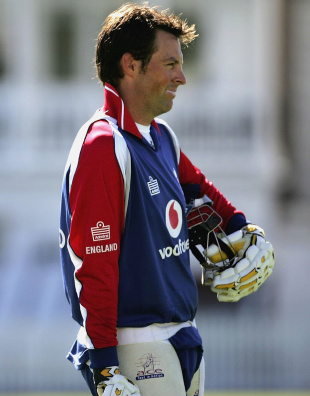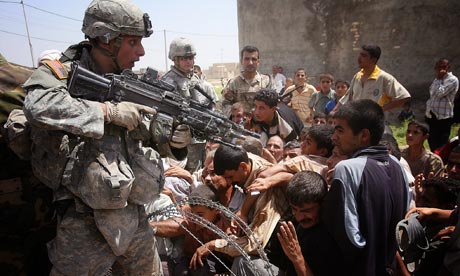by Mike Brearley in Cricinfo

|
|||
Depression is a terrible thing. People struggle to describe it to those
who aren't subject to it: darkness, pointlessness, worthlessness; a
black dog, perhaps, or a nuclear winter of the soul. There are often
suicidal thoughts, which can dominate consciousness. Depressed people
can't concentrate, can't think, feel lethargic, guilty, worthless and
irritable. There may well be disturbance in sleep, and in eating and
digestion. Some turn to drugs or drink. Those in its grip often seem
addicted to suffering, helpless and hopeless. There is inadequate
understanding of what it is about, why it has taken such a hold.
And, of course, there's no reason why cricketers more than anyone else should be immune: the image of Marcus Trescothick
hunched up in a corner of an electronic-goods shop at Heathrow while
his Somerset team-mates prepared to board a flight to Abu Dhabi for a
pre-season tournament remains a haunting one even four years later.
For sportsmen and women - but in particular men - depression has often been a badge of shame, especially in a world that values confidence, courage and the supposedly manly virtues of strength and assertiveness. When Trescothick's return home from England's tour of India in early 2006 was first explained, it was put down to a virus, which later changed to a "stress-related illness", still the terminology often used when his condition is discussed today. By the time Mike Yardy left the World Cup in 2011, the ECB did feel able to cite depression as the reason. This was a step in the right direction, but the reluctance to be open in the first place about Trescothick's plight stems, I believe, from a long-held idea that we should be thick-skinned and resilient; that to admit fear or unhappiness would be to lay oneself open not only to ridicule but to being dropped from the side (the very word "dropped" hints at the link to early-life anxieties and the insecurities of the baby). We are not supposed to be vulnerable, certainly not to show vulnerability. We don't wear our hearts on our sleeves - particularly not we English.
The proliferation of coaches and backroom staff over recent years may,
paradoxically, risk making the situation harder. In the old days, it
would be one's closest team-mates to whom one might admit anxiety; they
are, after all, in the same boat, and may have a less judgmental or
executive response. But the willingness of players such as Trescothick,
Yardy, the outwardly chipper Matthew Hoggard,
the former Derbyshire captain Luke Sutton, and even that tremendous
competitor Andrew Flintoff to admit to their feelings may suggest change
at a societal level: depression is not quite the taboo it once was.
And, unlike Trescothick and Yardy - who both felt compelled to explain
their departures from tours - the others were under no obligation to
talk about their emotions.
There are two separable things here: the reluctance to admit to feeling
low; and the increasing willingness of players to overcome that
reluctance. On the one hand, in order to be a good sportsman one must be
tough, a quality which can be weakened by self-doubt and fear. Players
may therefore rightly be apprehensive about too much self-doubt. On top
of this, there may be a reinforcement of such apprehension from the
macho attitude of those who mock ordinary doubt. It is this that leads
to the shame. However, self-doubt can be a necessary resource leading to
work, improvement and, in the end, greater strength, both technically
and emotionally.
Keeping things bottled up can be disastrous. The New Zealand seamer Iain O'Brien, another sufferer who has felt able to go public
about his condition, alluded to this process when he admitted that the
potential consequences of saying nothing were far worse than the
supposed shame of opening up. "I don't want to be one of those
statistics," he said, referring to those cricketers - and there have
been too many - who have ended up killing themselves.
Several have now risked this feared ridicule and come out as depressed.
O'Brien himself was encouraged to do so after listening to a radio
programme on the subject, hosted by Michael Vaughan in 2011, in which
Hoggard said he felt like crying as he reached the end of his run-up
during his final Test appearance, in Hamilton.
The revelation was a poignant one: Vaughan was Hoggard's captain in
that game. Not long before my time as a player, bowlers were reluctant
to show emotion even when they took a wicket; Hoggard's openness was an
encouraging sign of the times. Equally refreshing has been the respect
accorded by the press to both Trescothick and Yardy. Despite inevitable
pressure from their editors to get the story, journalists have been
sensitive enough to allow the players to tell it in their own time. And
admitting the extent of the problem may be the first step towards
healing and repair.
So why the apparently growing need for healing and repair? Has
depression become more prevalent for cricketers? It may be that the
speeding up of life, the demand for quick fixes, the "taking the waiting
out of wanting" - as the 1980s credit-card advertisement so pithily put
it - make for more depression, not less. Such a culture seems to
require happiness, briskness, a capacity to succeed early, and in
overtly measurable ways. So cricket, with its waiting around, its lonely
trudge back to the pavilion, its longueurs, its rain-breaks, may offer a
testing task to the modern young man or woman.
But there must be more to it than that. For depression often arises in
relation to loss, especially loss that the person cannot, for whatever
reason, successfully mourn. It may be of a significant other; it may be
more a matter of long separations and loneliness; or it may be of
prestige, position or power, such as comes with loss of form, or decline
with age, or from a realisation that one is not the only pebble on the
beach. Cricket is no exception. Careers are short - few go on beyond
their late thirties, unless offered a juicy contract by a Twenty20
franchise. Since most professional cricketers are in it primarily
because they love the game, and since it has such intensities of effort,
elation and disappointment, the loss related to retirement is bound to
be painful. By the time you retire, your contemporaries in other fields
will have moved onwards and upwards, while you have to start afresh.
Most ex-professional cricketers will never again be so directly involved
in doing what they are passionate about. Even jobs which involve the
skills and knowledge of the sport - umpiring, coaching, commentating or
writing - may seem less intensely vocational than playing at a high
level, and few go into second careers which involve them as cricket did.
Shakespeare, naturally, had a phrase for this general truth about life:
"And every fair from fair sometime declines, by chance or nature's
changing course untrimmed." For the cricketer, nature's change of course
can be too early, too fast, and too damaging. Hoggard, remember, was
discarded by England's Test team virtually overnight during that tour of
New Zealand.
| Depression is an arrangement by which we keep from ourselves the degree of hostility we feel, turning it on ourselves, but in a way inflicting it on others indirectly | |||
Loss is harder to bear and more likely to turn into depression if one is
full of hatred. All losses evoke some anger: how dare you leave me! But
for some it is particularly strong; loss and separation may evoke
bitterness and anger such that in the imagination there are murderous
impulses to the person one misses. New Zealand's Lou Vincent, who was
dropped on more than one occasion, told the Independent: "I was
passionate about playing for New Zealand. But how many times can you be
let down by something that you love? It's like the love of your life,
she takes you back and she drops you. How many times can you have your
heart broken?" Since that person - or, in the case of Vincent, that
organisation - is often the very person one would turn to in a crisis,
the hostility towards them, and the ensuing guilt, leaves the subject
doubly alone. It is harder in such cases to mourn and move on.
Closely related to letting go of one's passionate activity is decline in
form. Failure is stark and public. Like a king deposed, the dismissed
batsman has to leave the arena; the bowler is merely taken off. The
batsman may have to wait days for another chance. One little error, one
good delivery, can result in total exclusion. And such outcomes are
reported instantly to the public. The starkness of a scorecard that
reads "Gatting b Warne 4"
tells the casual observer nothing about the drama of the moment. Luck
plays a big part. What's more, failures which may be a result of bad
luck eat away at one's confidence, making form not only mercurial and
uncontrollable, but self-fulfilling, the outcome of self-denigration.
There can so easily be a vicious circle.
One type of such destructiveness happens when the person is prone to
grievance: the glass is always half empty. Such a person is addicted to
suffering and to inflicting suffering; he focuses on what he doesn't
have, rather than what he does. He even prefers suffering - perhaps in
dramatic or histrionic ways - to making the best of a bad job, and
appreciating what he has. Depressed people feel passive, have no energy,
a damaged sense of self. They may trade on this, stoking up the role of
victim and, without realising, choose it over the ordinary struggle
involved in getting on with things. As Iain O'Brien perceptively put it:
"Wrapped up in it is how you value and see yourself."
Depression is more likely, too, for someone who at heart feels
fraudulent, which itself is related to the weight of expectation felt by
international sportsmen. Then - because that fraudulence may have been
repressed - the depression can be experienced as something alien to the
conscious self, a black dog, something that comes from outer space, or
from a blue sky. Reflecting on his swift demise, Hoggard told Vaughan:
"I was just thinking that the world was against me, that I'm rubbish,
that I can't do this anymore. It just got on top of me. The self-doubt
was huge."
People may be depressed at failure, but also at success. How often do we
see a tennis player lose his serve immediately after breaking his
opponent's? I think this is to do with guilt at triumph, at superiority.
We may, in hidden ways, gloat over our defeated opponent or upstaged
rival, and this may be so hard to bear that we contrive to fail rather
than risk it. We may also discover that success isn't the panacea we
have expected. No doubt post-natal depression has many causes, but one
might be: this is not a bed of roses!
This may be hard to see in sport, partly because, as spectators,
journalists and readers, our attention is so fixed on success; and those
who are consistently successful are better able to accept their
aggression and manage it well. But I am convinced, partly from my own
experience, that we often do draw back from success, reluctant to risk
gloating over a defeated rival who in the depths of our minds evokes a
father or a sibling. We may also identify with that part of the other
which wishes to knock the successful off their pedestals.
Depression, then, is an arrangement by which we keep from ourselves the
degree of hostility we feel, turning it on ourselves, but in a way
inflicting it on others indirectly. The depressed person is savaged by a
judgmental inner voice, whose punitiveness mirrors the often
unconscious wish to hurt the person felt to have let him down. He may
also displace his bitterness and anger from the lost person on to an
available target (an umpire, for example), like someone who comes home
from a humiliating day at work and kicks the cat.
So the cricketer has to tolerate loss of form - and with it, perhaps,
his place in the team, even his career - and the early ending of at
least one of the loves of his life. It can, as Lou Vincent implied, feel
like the end of a love affair, or like a sticky patch in a marriage;
loss of, or decline in, bodily skill can, like later mental decline, be
experienced as the surrender of the essential self. No wonder some find
it unbearable. As David Frith catalogued in Silence of the Heart,
published in 2001, no fewer than 150 professional cricketers had by
then committed suicide. And this must have been the tip of a much larger
iceberg of players who had been depressed but not gone to this
ultimate. During his career, the successful cricketer also spends a lot
of time travelling. Some find this separation from loved ones,
especially at great distances, troublesome. One reason why, on the
whole, teams do so much better at home lies here. The depression
suffered by both Trescothick and Yardy was exacerbated by being far away
from the people who knew them best and by the lack of a comparable
support network on tour.
Of course, it can be hard to know what is going on in people's minds.
But I was occasionally aware of a player being in difficulties, perhaps
depressed, especially on tour. And loneliness was often at the heart of
it. Some found big hotels in large cities anonymous and not conducive to
feeling safe and at home. By contrast, the communal experience of
staying in circuit houses or small hotels in India or Pakistan back in
the 1970s, usually outside the main cities, could create a feeling of
togetherness, humour and sociability that was much harder to find in the
five-star luxury of a modern big-city hotel; some would stay in their
rooms evening after evening, eating dinner on their own. Such patterns
could be hard to notice when there was no place of focus once we were
away from the dressing room, the manager's room, or the team bus, and
the habit could become more addictive if morale dropped lower. A vicious
circle of alienation and loneliness could ensue if no one became aware
of it.
Such scenarios also happen in England. There are county cricketers who
find it hard to be away even from their home town. One county captain I
knew made himself available for dinner with a team member who was prone
to depression during every away match. For some, loneliness is an
outcome of the sheer routine of socialising on a cricket tour. A certain
sameness can become limiting. Such people need other, perhaps more
culturally varied, stimuli. Sometimes, one needs to get away from the
close cricketing family.
During my playing days, tactful help and awareness of the problem
prevented it from getting a grip on a few individuals. Captains and
managers vary greatly in this important ability to be sensitive to
people when they become unhappy, or aggrieved, or bored. One of Doug
Insole's many assets as England manager was in this area. It would be
hard to write "sensitivity to potential depression" into the job
description of today's England coach. But ordinary human consideration,
concern for everyone in the party, and tact should be. And occasionally
that would extend to recognising that something more than ordinary
friendly management is required, that a player needs to get specialist
treatment, and may even have to leave the team for the time being.

|
|||
Despite all this, the sporting arena itself can provide an antidote,
since sport does permit aggression. Many people give the impression that
only on the field can they be thoroughly and spontaneously themselves,
though here again, this can make retirement, or absence through injury
or poor form, feel like a loss of the true self. But at least the
sportsman might be helped to avoid depression by the fact that sport has
aggression built in. What is not so readily permitted in its ethos is
envious rivalry with one's own team-mates. I think it's impossible not
to feel some envy at the successes of a colleague who is vying with you
for a place, and this can arouse guilt and shame. So aggression can be a
problem when one can't enlist it, and also when one can but with too
much or inappropriate venom or force.
Sporting teams are, as I've suggested, tough social groups, and the
effect can be amplified in cricket, where the participants spend so much
time with each other. Vulnerability may not be respected. Professional
cricketers can be quick and perceptive, often cruelly so. The dressing
room is not an easy place in which to hide. The rough and tumble, the
sarcasm and mockery, are mostly friendly, but can also become bullying,
the stuff of small boys in school playgrounds. In short, for some
cricketers, aggression causes problems rather than provides a safety
valve.
Perhaps what I have suggested in relation to both loss and aggression
could be summed up thus: what doesn't kill you - or make you depressed -
leaves you stronger. The tipping point can be hard to predict, perhaps
the outcome of chance and the presence or absence of the right person,
or the right piece of good luck, at the right time. Sport can indeed be
an antidote to depression. I remember a time when I was in turmoil in my
personal life; batting and playing, however difficult to do well,
provided an arena in which life's aims and objectives were for a while
simplified. It is not easy to hit a hard ball delivered with speed and
skill by a fellow professional, but facing it does, like imminent
execution, concentrate the mind.
And yet there is no escaping the profundity of depression - nor, as I
noted at the beginning, the difficulty among non-sufferers of grasping
it. As Trescothick said: "There's so much to it. People say: 'Pull
yourself together, move on.' I wish it was that simple. You try to
forget, but it takes over your whole life." Our understanding of this
crippling condition, especially in the sporting arena, may merely have
scratched the surface. And even when something is recognised and
acknowledged, it is still hard to know what's best for the sufferer.
Sportsmen want, above all, quick fixes, as with physical injury. The
trouble is, established patterns can take a long time to shift.
Mike Brearley played in 39 Tests for England between 1977 and
1981, captaining them in 31, of which 18 were won and only four lost. He
is a practising psychoanalyst







